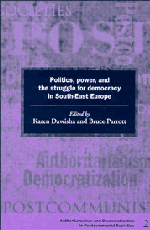Book contents
- Frontmatter
- Contents
- List of tables
- List of figures
- List of contributors
- Preface
- 1 Perspectives on postcommunist democratization
- 2 Democratization and political participation: research concepts and methodologies
- The former Yugoslavia
- Albania, Bulgaria, and Romania
- 8 The process of democratization in Albania
- 9 Democratization and political participation in ‘postcommunist’ Bulgaria
- 10 Romanian exceptionalism? Democracy, ethnocracy, and uncertain pluralism in post-Ceauşescu Romania
- Appendix
- Index
9 - Democratization and political participation in ‘postcommunist’ Bulgaria
Published online by Cambridge University Press: 01 June 2011
- Frontmatter
- Contents
- List of tables
- List of figures
- List of contributors
- Preface
- 1 Perspectives on postcommunist democratization
- 2 Democratization and political participation: research concepts and methodologies
- The former Yugoslavia
- Albania, Bulgaria, and Romania
- 8 The process of democratization in Albania
- 9 Democratization and political participation in ‘postcommunist’ Bulgaria
- 10 Romanian exceptionalism? Democracy, ethnocracy, and uncertain pluralism in post-Ceauşescu Romania
- Appendix
- Index
Summary
Introduction
Since the miraculous year 1989 Bulgaria has acquired a reputation as an island of stability in the Balkans. Bulgaria's progress toward the creation of a democratic order has been surprising since the country lacks a prosperous economy, a large middle class, and a developed civic culture – factors that scholars maintain provide the most fertile soil for democratic growth.
This chapter, taking a primarily chronological approach, begins with a brief description of the struggle for democracy that developed in the country following its emergence from five-hundred years of Ottoman rule in 1878, and it examines the social changes that took place under the communist regime. It then turns to the impact of Soviet perestroika and Gorbachevian “new thinking” that helped to undermine the regime of Todor Zhivkov.
The first stage of Bulgaria's transition lasted from the fall of Zhivkov to the adoption of a new constitution a year-and-a-half later. During this period, the influence of opposition leader Zheliu Zhelev was at its height and was reflected in the roundtable negotiations between the ruling Communists, who soon changed their name to Socialists, and the opposition. The critical June 1990 elections and the work of the Grand National Assembly laid the groundwork for the postcommunist era in politics.
The chapter then turns to the Union of Democratic Forces, which took power at the end of 1991, to explain the reasons for the failure of its government and its near marginalization as a political force.
- Type
- Chapter
- Information
- Publisher: Cambridge University PressPrint publication year: 1997
- 10
- Cited by



